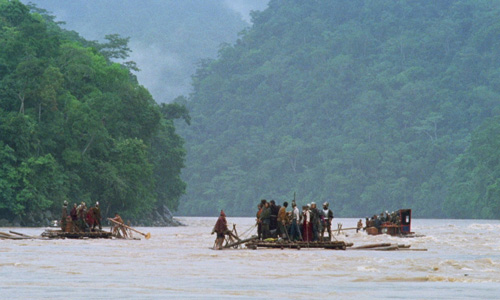Teaching, learning, and collaboration can be very challenging tasks, complicated by the fact that doing any of them well is often pretty much impossible if you aren’t attempting the other two at the same time. They also essentially define the job description for any project I’ve seen the research group be involved in. So in case it helps, I recently stumbled on a piece of advice from John Steinbeck on this matter in the form of a tribute he wrote of his friend, marine biologist Ed Ricketts.
“I have tried to isolate and inspect the great talent that was in Ed Ricketts, that made him so loved and needed … I have thought it might be his ability to receive, to receive anything from anyone, to receive gracefully and thankfully and to make the gift seem very fine. Because of this everyone felt good in giving to Ed…
Ed’s gift for receiving made him a great teacher. Children brought shells to him and gave him information about the shells. And they had to learn before they could tell him. In conversation you found yourself telling him things – thoughts, conjectures, hypotheses – and you found a pleased surprise at yourself for having arrived at something you were not aware that you could think or know. It gave you such a good sense of participation with him that you could present him with this wonder.
Then Ed would say, “Yes, that’s so. That’s the way it might be and besides —” and he would illuminate it but not so that he took it away from you. He simply accepted it
Although his creativeness lay in receiving, that does not mean that he kept things as property. When you had something from him it was not something that was his that he tore away from himself. When you had a thought from him or a piece of music or twenty dollars or a steak dinner, it was not his – it was yours already, and his was only the head and hand that steadied it in position toward you. For this reason no one was ever cut off from him. Association with him was deep participation with him, never competition.”
Not only does it sound as if Ricketts has a knack for producing a pleasant environment for inquiry, I think there’s a lot to be said for his approach of “Yes… That’s the way it might be and besides —“. It can be very difficult to participate in the academic and political landscape and avoid the temptation to try and ‘police’ peoples’ activities. In any field of research there is always the potential for results to be misapplied, misrepresented, or simply miscalculated. This can result from naive or cynical practise, through mistakes and limitations in understanding or from the need to better market the relevance of output in response to external (typically financial) or internal (typically egotistical) pressures. There are often unfortunate consequences to such behaviour, both for the state of understanding and the results when (mis)information is acted on. As such, critical evaluation is essential, whether through more established methods such as peer review, or though other forms of engagement.
It’s important, however, that such engagement does not become just another move in the sad and inherently unproductive games of academic and political one-upmanship. An ugly fight over who get’s to give and what that will be. What is necessary is to demand honest evaluations of what it is we are learning from our investigations and gaining from our activities, while avoiding stifling development or social benefit by insisting on overly restrictive practices or overly ambitious criteria. Contrary to popular imagination, progress in any area is typically less about ‘bright ideas‘ and more a product of an endless rehashing/reimagining [case in point, this blog post] and exhaustive searches for more effective or novel applications. If done creatively and with awareness of larger needs and contexts, this allows us to stumble further along in useful ways. It seems Rickett’s attitude allows ideas or investigations to be taken at face value. Rather than then requiring us to insist that our ideas/results are ‘right’ (when we know there are inherent limitations in any approach/activity) or that others are ‘wrong’ (rather than make use of the insight their work might offer), we can give due acknowledgement and say “Yes, maybe, and what can we learn from this, and where could we take it?”.
The quoted passage appeared in the publication of The Log from the Sea of Cortez a description of field trip that Ricketts, Steinbeck, and others had taken, documenting tidal marine life around the Gulf of California. Steinbeck chose to refer to the trip as an ‘expedition’ to the ‘Sea of Cortez’, admittedly because it sounded “more exciting”. The reference to the now abandoned place name derived from the infamous conquistador is not without irony, and for a cover image for this blog post I’ve taken a still from Werner Herzog’s Aguirre, The Wrath of God; a film where a band of conquistadors travel down the Orinoco and Amazon rivers in a doomed search for El Dorado, a fictitious city of gold. Maybe Rickett’s example reminds of the possibility to engage with each other, not through a destructive crusade for an imaginary city and the gain and/or righteousness it implies, but through receptive exploration that allows us to present each other with wonders.
